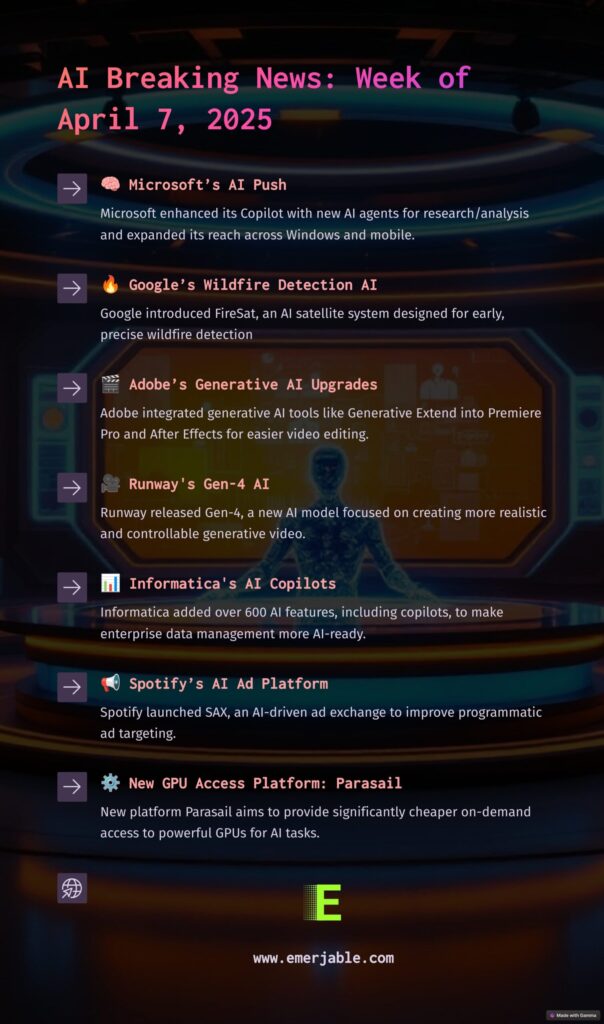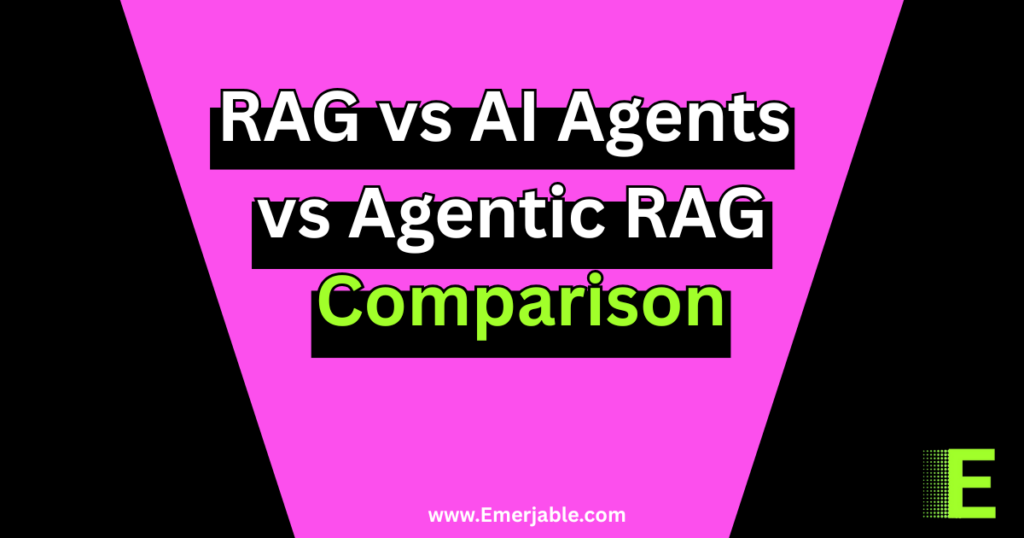Here are the top AI news highlights from the past week (late March to early April 2025):
🧠 Microsoft’s AI Push
- New Reasoning Agents: Microsoft launched two AI agents — Researcher and Analyst — within Microsoft 365 Copilot to automate tasks like in-depth research and large-scale data analysis. A similar upgrade hit Microsoft Security Copilot, helping IT teams with threat monitoring and security automation.
- Copilot Expands: Microsoft’s Copilot now integrates with Windows and mobile, offering real-world AI help. It even gained web-browsing capabilities to complete tasks on users’ behalf.
🔥 Google’s Wildfire Detection AI
- Google introduced FireSat, an AI-enhanced satellite system developed with Muon Space, for early wildfire detection. It’s capable of identifying fires as small as 5×5 meters, aimed at reducing damage through earlier alerts.
🎬 Adobe’s Generative AI Upgrades
- Adobe dropped a major AI update for Premiere Pro and After Effects. Features like Generative Extend (for lengthening media without quality loss) and Media Intelligence (AI-powered search and organization) are designed to streamline video editing.
🎥 Runway’s Gen-4 AI
- Runway released Gen-4, a powerful generative video AI model focusing on realism and dynamic motion. It promises more controllable, high-fidelity video generation — a leap forward for creative media tools.
📊 Informatica’s AI Copilots
- Informatica rolled out over 600 AI-related features to its data management platform, including copilots and GenAI recipes, all focused on making enterprise data more “AI-ready”.
📢 Spotify’s AI Ad Platform
- Spotify launched Spotify Ad Exchange (SAX) to supercharge programmatic ad buying with AI. It integrates with platforms like Google DV360 and The Trade Desk to optimize real-time ad targeting.
⚙️ New GPU Access Platform: Parasail
- AI veterans launched Parasail, a new AI deployment network offering on-demand GPU access (H100s, A100s, etc.) at up to 30x lower costs than major cloud providers. It aims to democratize access to high-performance AI compute.

General Trends & Company Developments:
- Personalized AI Companions: Microsoft’s AI division head, Mustafa Suleyman, emphasized the goal of creating personalized AI companions that learn about users over time, potentially having unique names, styles, and even visual appearances. This highlights a trend towards more integrated and relational AI assistants. Google is also advancing this with features allowing Gemini to personalize responses based on user Search history. (AP News, Google Blog)
- Google’s Continued Expansion: Google announced several updates in March 2025, including expanding access to AI Overviews in Search (used by over a billion people), introducing an “AI Mode” in Search, releasing Gemini 2.5 Pro, and Gemini Robotics aimed at physical world applications. They also rolled out AI tools for developers, shopping (like ‘vision match’ for clothes), and environmental protection. (Google Blog)
- Intense Competition: The race is on between major players like Microsoft (with Copilot), Google (with Gemini), Meta, OpenAI, and Amazon (enhancing Alexa) to develop the leading AI models and personal assistants. (AP News)
- Meta Leadership Change: The head of Meta’s AI research division announced plans to step down ahead of the company’s LlamaCon AI conference. (AP News)
AI Applications & Use Cases:
- Healthcare: AI is being developed and studied for various medical applications, including diagnosing conditions like mpox, attempting to reduce racial bias in models, and assisting in virtual urgent care settings. One study found AI recommendations were often rated higher quality than physician decisions for guideline-adherent care, though physicians excelled at adapting to new information. (HCPLive)
- Legal Field: AI continues to make awkward entries into the legal world. An AI avatar attempted (unsuccessfully) to argue a case in a New York court. This follows previous incidents where lawyers faced fines for citing fictitious cases generated by AI chatbots. Conversely, Arizona’s Supreme Court has started using AI avatars to summarize rulings for the public. (AP News)
- Environmental Monitoring: Google is involved in initiatives using AI to protect nature, including launching a satellite constellation (in collaboration with others) designed to detect wildfires using AI and releasing an open-source AI model (SpeciesNet) to identify animal species from camera traps. (Google Blog)
- Infrastructure: The U.S. Department of Energy has identified 16 federal sites, including labs like Los Alamos, as potential locations for tech companies to build AI data centers, aiming to accelerate commercial AI development. (AP News)
Regulation & Societal Impact:
- EU AI Act Implementation: The EU AI Act, formally adopted in March 2024, is moving towards full applicability in August 2026. Key deadlines are approaching (e.g., codes of practice by May 2025). Debates continue around transparency requirements, handling high-risk systems, and copyright issues (cultural organizations are raising concerns about protections for creators). Controversies, like Hungary’s proposed use of AI facial recognition, highlight enforcement challenges. (Stibbe)
- Ethical Concerns: An AP investigation mentioned the use of AI models from Microsoft and OpenAI in an Israeli military program for target selection. Additionally, a Microsoft/Carnegie Mellon study found generative AI could potentially inhibit critical thinking skills, although Microsoft’s AI lead expressed disagreement with this conclusion. (AP News)



